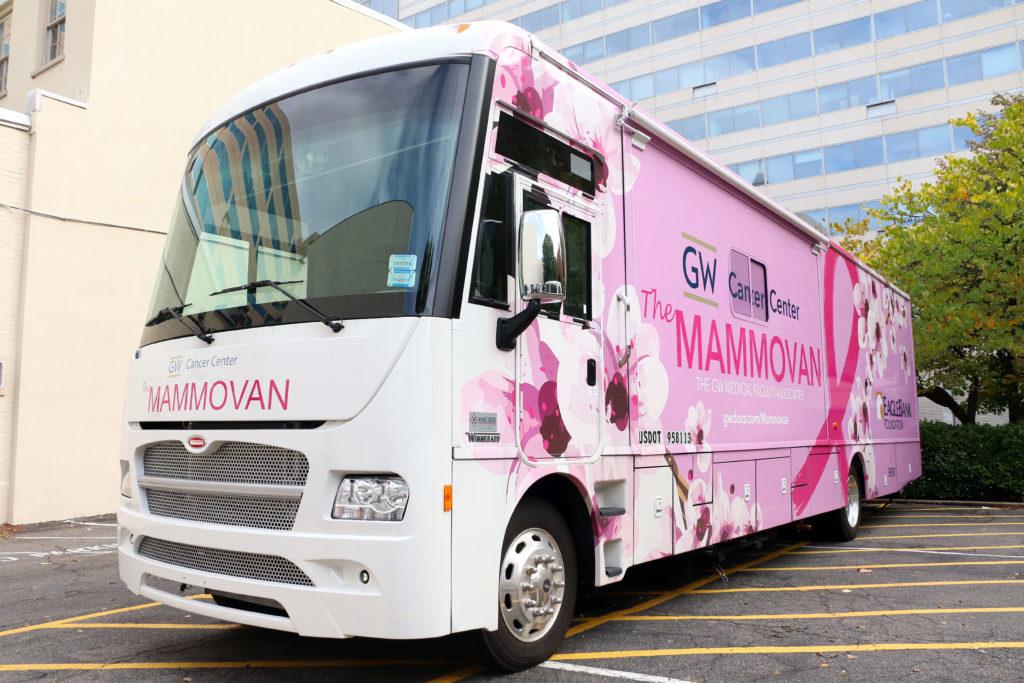Across the street from the law school, a bubblegum-pink, cherry blossom-adorned van sits, waiting for patients to walk through its door for a free breast cancer screening.
More than 20 years after the opening of the Mammovan – a 40-foot-long, 15-ton van that provides women with free breast cancer screenings year-round – doctors have screened more than 37,000 women for breast cancer. The program has also received almost $500,000 from a single charity as the van acts as a way to promote health equity in the District, officials said.
“It has allowed us to offer the women that we see, regardless of their ability to pay, the latest technology,” Rachel Brem, the director of the breast imaging and intervention center for GW Medical Faculty Associates and the director of the Mammovan program, said.
The Mammovan screens approximately 25 uninsured women over the age of 40 each day. When it’s not traveling to screen patients, the van sits on the corner of 20th and H streets. The nine physicians in the program screen 2,500 women each year and work to provide early detection for breast cancer, especially for women who are unable to travel for doctor appointments, Brem said.
Brem added that doctors do not check tax records to see if women qualify for the free care – the physicians just “ask women to be honest” and provide free screenings to all patients.
“We want to offer the women in our community everything we can to get life-saving mammograms,” she said. “That’s what we do.”
Brem said the Mammovan houses one of the longest-running mobile programs in the country. She said the van continues to fill a need for accessible cancer screenings in the District, which has the highest death rate for breast cancer in the country, according to the D.C. Cancer Consortium.
Mobile mammogram clinics, like at the Dana-Farber Cancer Institute in Boston and at the University of California, San Francisco, also offer affordable breast cancer screenings.
Brem said that last year, Eaglebank – a bank in the D.C., Maryland and Virginia area – donated a new Mammovan to the program that features 3-D mammography technology.
Brem said annual fundraisers, like the Blush Lunch hosted earlier this month, also offset the expenses of the Mammovan. The Safeway Foundation – a charity organization run by the Albertsons Companies Foundation – was recognized as an honorary sponsor this year because it has donated more than $450,000 since the start of the Mammovan program, officials said.
Medical school spokeswoman Ashley Rizzardo declined to say how much money was raised at the Blush Lunch. She also declined to say how much has been raised to support the Mammovan since its launch.
The Mammovan was created in 1996 through a grant from the Prevent Cancer Foundation. The van’s daily screenings are funded through operational money from the Medical Faculty Associates in conjunction with donations from corporations.
“A $300 donation can provide a mammogram for a woman who can’t afford it,” MFA spokeswoman Barbara Porter said in an email.
Brem said the Mammovan program also works to address health disparities in minority communities in the District. She said the death rate for black women is higher than the death rate for white women with breast cancer, and the program works to engage communities that are “underserved” and have a higher risk of death from breast cancer.
Black women have a 20 to 40 percent higher breast cancer death rate than white women nationwide, according to the nonprofit group Breastcancer.org. Several factors likely contribute to the disparity, including genetics and differences in health care, according to the group.
Members of GW’s Cancer Center have also begun creating treatment plans and research that focus on minority groups’ health issues.
Sharad Goyal, a professor of radiology, said the Mammovan can help to both reduce the number of breast cancer-related deaths and help women in D.C. overcome issues like a lack of transportation, limited access to medical facilities and the cost of the examination.
“The GW Mammovan is an integral part of the GW Cancer Center, which is focused on the developing multidisciplinary clinical, research, education and outreach programs together in a comprehensive approach to cancer prevention, diagnosis, treatment and survivorship,” Goyal said in an email.





